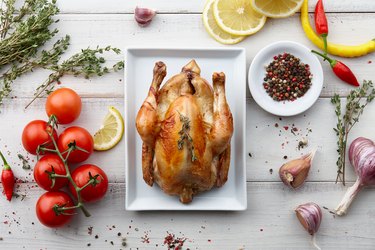
Things You'll Need
2 large cutting boards
Long, sharp knife with pointed tip
Carving fork or large fork
Kitchen towel
Large platter
Carving a turkey isn't rocket science, but even a moist, perfectly roasted turkey can seem a bit chewy or stringy if you get it wrong. To serve tender, neat portions of turkey, it's important to detach each section at the joint and then slice against the grain. This process is easiest when you carve each section in a certain order, using both a carving knife and your hands to separate the pieces. If you're not sure about the bird's anatomy, you should be able to find a turkey diagram with a quick internet search.
Step 1: Set the Carving Board
Place the turkey on a large cutting board with the breast side up. Have a second cutting board standing by to slice individual sections of the turkey. If you'll be serving right away, have your serving tray or a large plate nearby to receive the finished slices.
Video of the Day
Step 2: Remove the Legs
Pull the leg and thigh section away from the turkey until you feel the joint pop, using your carving fork or the back of your knife. Cut down through the joint that connects the thigh to the carcass, and use your knife and carving fork to transfer the leg to your other cutting board. Rotate the bird 180 degrees on your cutting board, and emove the other leg-thigh section in the same manner as the first.
Step 3: Carving the Thighs
Separate the drumstick from each thigh by cutting down through the joint between them. You can use the tip of knife to probe for the joint if you are not sure where it is. Slice the thigh meat by cutting parallel to the bone, and arrange the slices on a platter. If you are serving the skin, you may find it easier to slice the skin separately and serve it on top of the sliced thigh meat.
Step 4: Carving the Drumsticks
Stand the leg up vertically on the cutting board and slice downward along the bone to remove the leg meat. Pull out the fine bones and tough ligaments that connect to the bottom of each muscle, then ransfer the slices to youe platter. Alternatively, you can serve the drumsticks intact.
Step 5: Carving the Wings
Pull the wing away from the body to expose the joint. Remove the wing by cutting through the joint that connects the wing assembly to the breast. Remove the other wing in the same manner, and place both wings on the second cutting board. Cut through the joint connecting the "drumette" to the flat of the wing, and transfer both halves to the serving platter. You can remove the wingtips if you like.
Step 6: Carving the Breasts
Remove the breasts by slicing down along each side of the center breastbone until you hit the rib cage. Use your hands to peel the breasts away from the rib cage, and then run your knife along the bone to remove the breasts from the carcass. Transfer each breast in turn to the second cutting board. Slice the breasts crosswise, so you're cutting against the grain. Arrange the slices on the platter with the other pieces.
Tip
Before you start carving, let your turkey rest for at least 20 minutes. The rest period helps keep the turkey juicy and allows it to cool slightly for easier handling.
Kitchen counters are a better height for carving than your dining table, so it's easier to set up your cutting boards on your counter than carving at the dinner table. You'll have better leverage, and probably a bit more elbow room as well.
Video of the Day